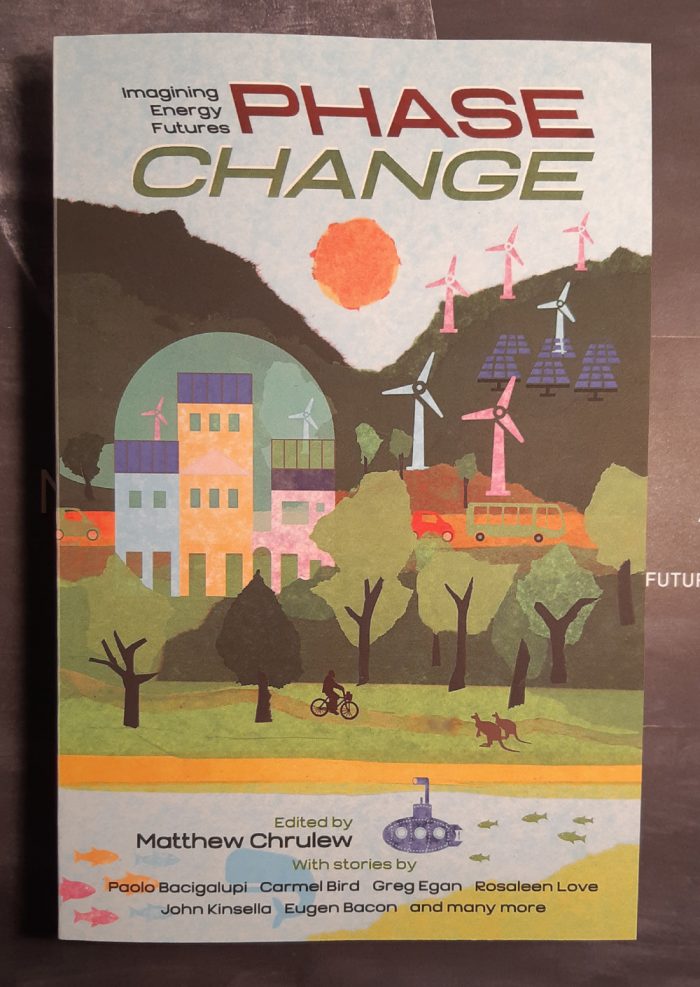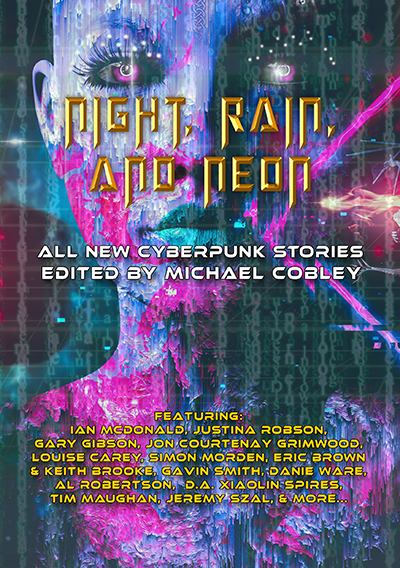My latest story is Mirrored, out now in Interzone #301.
Mirrored is the second story I’ve sold to Interzone (see my first Interzone story, the Aurealis Award winning Hollywood Animals in Issue #295). They bought it early in 2024, just a couple of months after my egg finally cracked, but it wasn’t until March or April that I thought back and realised that Mirrored was actually a deeply closeted trans story.
It’s about a model and influencer who becomes dispirited when he realises that not only has a tulpa usurped his social media account, but it is better at being an influencer that he could ever be. I wrote the first draft in 2018 for the first issue of Creeper Magazine, but we received more fiction submissions than we’d expected, so I filed it away and wrote the personal essay Blackbird (PDF, Text) instead. I wrote Mirrored as a sort of neo-Luddite lamentation about the ways social media – and the internet more broadly – forces us to commoditise our personalities and our very selves, how the algorithm strips the humanity from our feeds. And, of course, the story is still about that – and it’s arguably more relevant as larger chunks of the internet are being parasitised by generative LLMs – but also, my dysphoria is all throughout the story.
There’s a section where the main character, Omar, is at the gym working out, but there’s no sense that he enjoys it, that he’s doing it because he wants to, but rather because it’s part of the performance (for social media, or for his gender? You decide!). This section doesn’t match my experiences directly – when I started working out at the start of 2020, I was actually glad to be taking control of my body, though I’m sure the increased muscle mass and “more masculine look” that gave me was a big part of why I felt the need to shrug off masculinity and claim an agender identity. Prior to beginning to work out (which I’m continuing by the way, because muscular women are hot), my only form of exercise was running, and with the issues I had with my body, that usually meant running with the intention of losing weight. Around the time I moved to Melbourne I got down to around 65kg, and really wanted to lose another 5kgs. (Further proof that BMIs are bullshit – I was in the “healthy” range despite the fact that multiple people told me I should audition as a concentration camp victim in the Angelina Jolie film that was due to start filming in Australia.) I look back at the photos from then and I worry for myself. I want to cry for myself because I know how much self-loathing it took to get me to that point. And I realise now that I wasn’t simply trying to lose weight, I was trying to attain a pre-pubescent body shape, perhaps because some part of me subconsciously recognised that the puberty I went through was the wrong one.
And I think that’s all part of what comes through in the story if you’re attuned to it – as Maddison Stoff said after reading the story, it’s gender as self-harm. And that can manifest in all sorts of ways – dissociation, misogyny, exercise, violence, strict adherence to gender norms, et cetera.
I don’t want to drop too many chunks of the story in here – especially as a lot of the parts that read as dysphoric or closeted might not scan that way at first blush for anyone who’s not trans themselves, but I wanted to share one example.
He kept his face obscured—it never looked right in photos
For years I was guilty of soy-facing in photos – something that’s probably common among trans girls who were in the closet when it was a phenomenon. I didn’t know what to do with my face, and I hated how I looked in photos. But if I was pulling a deliberately silly face, then it wouldn’t matter how/how bad it looked. I recognise now that it’s a form of disassociation: I was deliberately putting distance between how I looked and “myself” because I didn’t want to see myself as that man I thought I was and dressed/behaved as.
A common refrain among trans people is that they knew they were trans for a long time, but for various reasons they couldn’t actually come out for X number of years. I never had that though – my dysphoria manifested purely as self-loathing, something I thought mental health drugs and therapy should help with. And maybe they did to some degree, but it was like trying to solve a jigsaw puzzle with only the border pieces. A solid starting point, but utterly lacking where it mattered.
I’m going to spoiler the ending for the original version of Mirrored. If you want to read it first, then you can go and buy the issue either at interzone.press/patreon or shop.interzone.press, then come back here. Otherwise, read on…
I always struggled to see a future for myself. I assumed it was because I would commit suicide one day, and whilst I don’t know that I ever considered it a serious option, suicidal ideation is one of the depression-related symptoms I most struggle/d with. So, the end of Mirrored saw Omar walking into the sea and letting it take him. Far too many trans people take their own lives. Let down by family, friends, governments, and medical systems, demonised by the media, hated by random people for absolutely no reason, they see suicide as preferable to continuing with the pain of life in a society that hates us. As a trans author I simply couldn’t release a story where the main character – who could easily be read as closeted – accepted their own death and walked willingly into it.
Thankfully, I explained this to Interzone’s editor – Gareth Jelley, who does amazing work and has a true passion for SF – and he understood where I was coming from, and was happy to let me write a coda to the story. Omar still walks into the sea and lets it take him, but in the morning a woman washes up on shore.
I won’t say more because the coda means a lot to me – I’ll just say that transition helped me find love for myself, and I was really happy with how I was able to represent that.
I don’t know that I made the story better, but I made it truer, and I made it something that will hopefully speak to trans people, whether out or still figuring it out. And I want to thank Gareth for giving me the chance to make that change. Publishing’s slow pace can be a source of frustration, but here it helped me remake a story into something that really matters to me.


